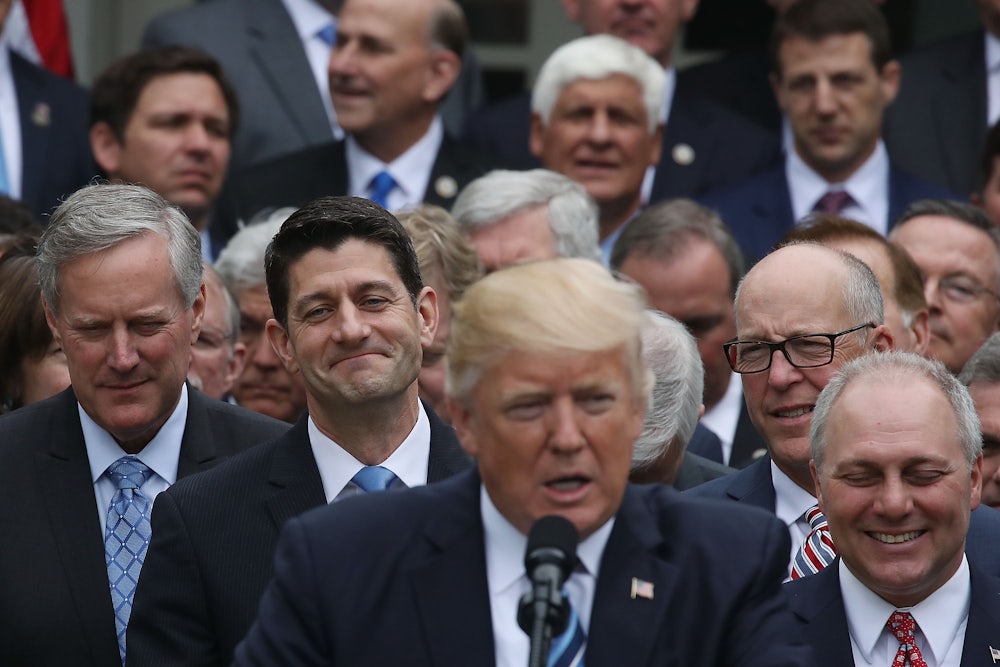Ninety seconds is almost no time at all—shorter than a pop song, not even enough time to finish a cigarette. Yet that’s all the time that the Senate will have to debate the Graham-Cassidy-Heller-Johnson bill, which, if passed, will radically overhaul health care and roll back the Affordable Care Act’s expansion of coverage. As Business Insider reports, “Perhaps most incredibly, the GCHJ would still be considered as a substitute amendment to the House bill passed in May. This means that the GOP would technically be restarting the process that was used when their previous Obamacare repeal effort failed. Based on where that process was, the GCHJ would get only 90 seconds of debate before it would be voted on.”
The bill is under a tight deadline: The Republican majority in the Senate has only until September 30 to pass the bill with 50 votes (plus Vice President Mike Pence’s tie-breaking vote). After that deadline, it’ll be subject to the filibuster and require an impossible 60 votes. And it’s impossible to know what the full impact of the Graham-Cassidy bill will be because the Congressional Budget Office doesn’t have enough time to do provide a full score before that deadline. According to CNBC, the CBO “will not estimate how a new Obamacare bill will affect the number of uninsured Americans, insurance premiums and ultimately the federal deficit in coming years until after the Sept. 30 deadline for passing that legislation.”
Graham-Cassidy is just the latest incarnation of Zombie Repeal, the Republican Party’s relentless, mindless, undying push to “repeal and replace” Obamacare. It is the ultimate example of political nihilism. Republicans are hurrying (yet again) to pass a law without any pretense of knowing what is in it and what its impact will be. During the last attempt at Zombie Repeal, Senator John McCain, who cast the deciding vote against it, spoke forcefully about the flawed process that produced the so-called “skinny repeal,” saying, “We must now return to the correct way of legislating and send the bill back to committee, hold hearings, receive input from both sides of aisle, heed the recommendations of nation’s governors.” All the process flaws that McCain identified in the skinny repeal are on display in the Graham-Cassidy bill.
Zombie Repeal is the most incontrovertible evidence that the GOP is not guided by policy outcomes. Republicans in both the House and the Senate express barely a trace of concern about how many people will be insured in the coming years if Obamacare is repealed. Rather than policy outcomes, they’re motivated by several dubious political goals. Historian Nelson Lichtenstein listed them in Dissent: to fulfill a longstanding rhetorical promise to their base (or suffer the electoral consequences); so President Donald Trump can claim a “win,” and because entitlement cuts will help them “cut taxes for the donor class.” That last factor might explain why Zombie Repeal keeps coming back from the dead. “With the waning of the culture wars, tax reduction for the rich remains one of the few planks upon which party moderates and conservatives can agree,” Lichtenstein wrote. “Medicaid, both the expanded version legislated by the Affordable Care Act and traditional Medicaid that existed for decades before the new law, is a de facto single-payer program for the poor and the bottom half of the working class.”
Medicaid is the piggy bank that the Republicans need to smash and grab if they want to offer serious coin to the rich. If we see Zombie Repeal as being primarily driven by tax policy, then it can be seen as part of a larger history of GOP nihilism. The original big lie of the modern Republican Party was supply-side economics, the dream that you could provide tax cuts without making either serious spending cuts or worrying about the deficit. While supply-side economics still has cultists who cling to the sham math of “dynamic scoring,” most lawmakers know that tax breaks have to be paid for with some spending cuts. The farcical effort to push through a Zombie Repeal without even knowing its impact is driven by the urge to break the piggy bank.
The dishonesty of supply-side economics seems relatively benign in retrospect. Its main damage was to run up the huge deficits under President Ronald Reagan. By contrast, Zombie Repeal could end up costing tens of millions of Americans their health care coverage. And for the all talk of late about Trump’s dalliance with the Democrats, in many ways he’s the most quintessentially Republican leader for this nihilistic moment—for no one has less regard for policy, and more concern about political outcomes, than he does. You might call him our Zombie President.
